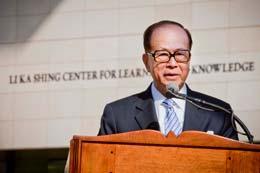New Canadian millionaires

Almost half of Canada’s richest residents are new immigrants or first generation Canadians, according to research conducted for the Bank of Montreal.
The survey found that two-thirds of Canada’s millionaire respondents were self-made, with only 20 per cent attributing at least part of their wealth to an inheritance.
And 48 per cent were either immigrants to Canada (24 per cent) or described themselves as first generation Canadians, with at least one parent born outside of Canada (24 per cent), according to the research.
The province of British Columbia has the highest proportion of millionaires belonging to immigrant families, at 68 percent, while the rate in every other province is below 50 percent.
In British Columbia the survey that found 68 per cent of high-net-worth British Columbians — those with investable assets of $1 million or more — were either born outside of Canada or had at least one parent born outside the country.
That compares with 48 per cent nationally.
The survey also found that women respondents made up one-third of Canada’s millionaires, up from 21 per cent three years ago.
Among women, 40 per cent of respondents said they generated their own wealth and one-third managed their own investments, compared to 59 per cent of men who said they do.
For the purposes of the study, wealthy was defined as respondents with investible assets of $1-million or more. “Today’s women are controlling more and more wealth in Canada, and that number is increasing by eight percentage points annually,” said Alex Dousmanis-Curtis, senior vice-president and head, BMO Harris Private Banking, in a statement.
“It’s clear that the face of wealth in Canada is changing.” The online survey was conducted by Pollara between March 28 and April 11, 2013, with a sample of 305 Canadian adults with $1-million or more in investable assets.
The margin of error for a sample that size is plus or minus 5.6 per cent, 19 times out of 20. The U.S figures come from an identical study in the same period among 482 wealthy American adults.
The survey flies in the face of a recent commentary in the Vancouver Sun by Simon Fraser University Professor Herbert Grubel who argues that immigration costs Canadians up to $20 billion a year when all the costs and benefits are tallied.
Grubel concludes that Canada should reduce immigration and only admit those with a high enough income earning and tax paying potential to increase the average income of native-born Canadians.
Meanwhile, a report out of Hong Kong said millionaires in Asia outside Japan will create $7 trillion in net new wealth by 2016, boosting the share of global riches from emerging markets, according to McKinsey & Co.
China, India, South Korea and Taiwan are the leading wealth generators in Asia, where millionaires’ personal financial assets will surge 15 percent a year to reach $15.8 trillion from $9 trillion at the end of 2012, McKinsey said in a survey of private banks.
Asia, combined with fast-growing Latin America, the Middle East, Africa and central and eastern Europe, will account for about 37 percent of an estimated $80 trillion of global private wealth by 2016, up from 24 percent at the end of 2008.
“Asia is the highest growth region for private banks and will continue to be so,” McKinsey said. “Most private banks are trying to broaden their product offerings to cater to the specific needs of an Asian clientele.”
First-generation Asian millionaires will help the region deliver more than one third of profit sources for global private banking by 2016. The Chinese market is “open to competition as nearly half of China’s high-net-worth individuals have only a limited understanding of private banking,” according to the survey.
International managers with offshore units in Asia won’t reap all the benefits of the growth as more than three quarters of wealth is booked onshore where local banks dominate. Taking into account lower margins on offshore assets versus onshore assets in the region, local banks will outperform international firms, McKinsey said.
Future growth in personal wealth in Asia will be slightly lower than the 16 percent annual increase from 2008 to 2012, McKinsey said. Asia outside Japan, the third-largest wealth market at the end of 2012 behind North America and western Europe, will climb to second place over the next four years.
Worldwide, the number of millionaires will rise 30 percent to 16 million by 2016, according to McKinsey. North American millionaires’ assets will jump 7 percent a year to $27.4 trillion by 2016 from $22.6 trillion at the end of 2012.
Millionaires’ personal wealth in western Europe will climb 4 percent annually to $15.7 trillion by 2016 from $13.7 trillion at year end 2012, while total private wealth worlwide will rise to $80 trillion from $60 trillion, according to the report.
The shift in wealth toward developing economies and the need to adjust to a new generation of clients combined with a rapid increase in tax and regulatory requirements may prompt private banks to become more selective in their geographical focus, client mix and services and fuel industry consolidation, McKinsey said.
Leave a comment









